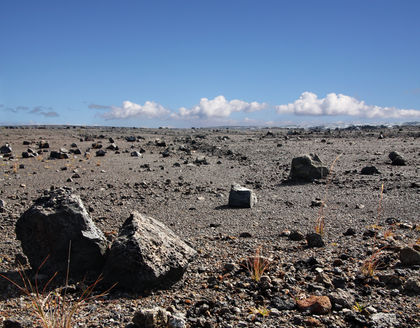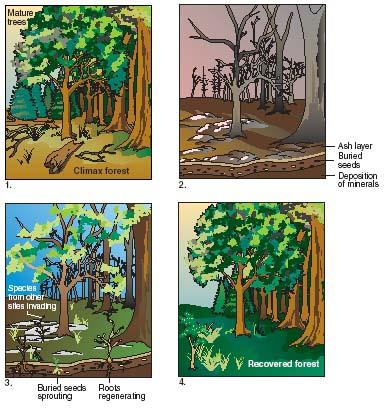Succession

Succession is a process of ecological change in which a series of natural communities are established and then replaced over time. Ecologists (scientists who study the relationships of organisms with their living and nonliving environment) generally recognize two kinds of succession, primary succession and secondary succession. Primary succession takes place on an area that is originally completely empty of life. As an example, an area that has been covered by a flow of lava has, for a time, no life at all on it. Over a period of time, however, various kinds of organisms begin to grow in the area. Over time, the variety of life-forms changes as succession continues.
Secondary succession is far more common. It occurs in an area where life once existed but has then been destroyed. For example, imagine a forest that has been destroyed by a wildfire. Again, for a period of time, no living organisms may exist in the area. Before long, however, certain types of plants begin to reappear. And, as with primary succession, the nature of the plant communities gradually change over time.
The stages in ecological succession
The changes that take place during any form of succession depend on a variety of environmental factors, such as the amount of moisture, temperature, and wind. One possible scenario for primary succession might begin with the appearance of simple plants, such as lichens and mosses. Such plants are able to spring up in tiny cracks in the rocks in which water and dissolved minerals collect.
When these pioneer plants die, they decompose and begin to form soil in which other, more complex plants can begin to grow. The second stage of plants might consists of grasses, herbs, and small shrubs. A characteristic of these plants is that they devote a great deal of energy producing huge numbers of seeds. They may live only one year, and spend the greatest part of their energy to ensuring that offspring will arise the following year. Species of this kind are known as opportunist species. Grasses are a common example of opportunist species.
Plants that make up the early stages of succession also die, decompose, and contribute to the growing layer of soil. This process takes place over hundreds or thousands of years, however. Eventually, the soil is able to support more complex plants, such as larger shrubs and small trees including aspen, black spruce, and jack pine. These plants gradually take over from earlier communities since they are taller, have more leaves, and can capture more sunlight that was originally captured by simpler plants.
In the final stages of succession, taller trees begin to grow. They, in turn, block out the sunlight needed by smaller trees and replace them. The final stage of ecological succession is known as a climax community. A climax community in the scenario outlined here might consist of birch, white spruce, and balsam fir.
Secondary succession
The general trends that take place during secondary succession are similar to those for primary succession. Imagine that a forest has been cleared for agriculture and then abandoned at a later date. In this case, a pioneer community consisting of lichens and mosses is not needed. Soil, rich or not, is already available.
In such a case, the first plants to reappear might be annual (living one year) weeds, such as crabgrass. At a somewhat later date, the weedy community might be replaced by perennial (those that live year after year) weeds, and then by shrubs, a pine forest, and finally a mature forest consisting of oaks, maples, elms, and other large, long-living trees.
Words to Know
Climax community: A relatively stable ecosystem characterized by large, old trees that marks the last stage of ecological succession.
Ecosystem: An ecological community, including plants, animals, and microorganisms, considered together with their environment.
Opportunist species: Plant species with short life-spans that devote most of their energy to producing seeds.
Pioneer plants/communities: Plants or communities that are the first to be established in an area previously empty of life.
Primary succession: Succession that takes place on an area that was originally completely empty of life.
Secondary succession: Succession that occurs in an area where life once existed but has then been destroyed.
As succession goes forward, the nature of plant communities changes significantly. Instead of sending out many seeds each year, as in a pioneer community, trees in more mature communities devote their energies to sending out roots, branches, leaves, and other structures. Indeed, as they grow larger and create more shade, they actually prevent the germination (first life stages) and growth of their own seeds and seedlings.
Climax community
Ecologists refer to the final, highest stage of ecological development in an area as the area's climax community. That terms refers to a relatively stable community that is environmentally balanced. Climax communities are more a theoretical than a real concept. Certainly it is possible to recognize in old-growth communities areas that change relatively slowly compared to the earlier, more dynamic stages of succession.

However, change in ecological communities is a universal phenomenon. Thus, even the climax state cannot be regarded as static.
For example, even in old-growth communities succession on a small scale is always occurring. That succession may involve the death of individual trees and the growth of new ones. As environmental conditions change, even climax communities themselves continue to evolve.
Simplistic and easy to understand.
Thanks again!
very user friendly and contains loads of useful precise information.
thanks
again, thanks alot!
but climax species has highest biodiversity and niche specialization
i cant get it!
can u pls. enumerate the different
types of ECOLOGICAL SUCCESSOIN !!!
and display it here?
Does ecological succession ever stop?
pls answer it quickly i need now the answer
Some clarification - the term climax community is not really used anymore because succession never stops. There are more stable communities in later years than the first stages of any type of succession but there is no "end." It has been suggested that the reason climax communities were once considered is because when an area gets to the tree stage, the life span of the species in question are often beyond human life span. So what may appear as a fairly static system maybe undergoing change but so slowly that it is imperceptible to humans.
That would be helpful for people like me who came to your website because it said great for school projects, i wish more people would come to my site. Now I know why they dont come. You need more information!!
Thank you.
It actually really helped me with my quiz thanks wbesite!